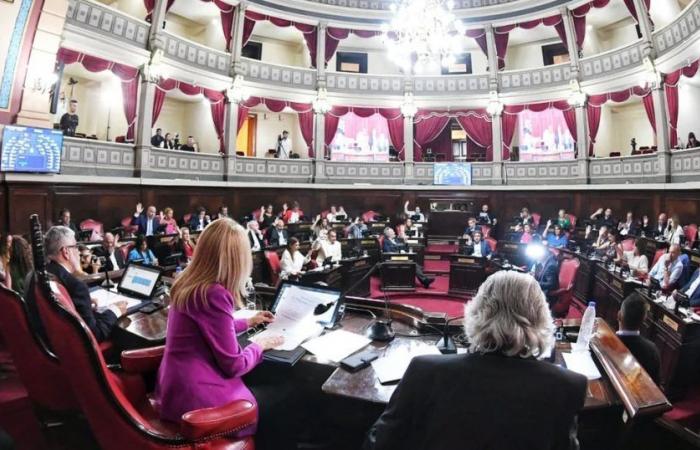
The project that increases compensation for dismissals in the province of Buenos Aires and that has already been voted on in the Buenos Aires Chamber of Deputies, generates noise in the Senate. In principle, the Buenos Aires opposition that makes up the PRO blocks, UCR-Cambio Federal, the two groups called Libertad Avanza and the PRO Libertad and Buenos Aires Libre uniblocks expressed their rejection of the project when days ago they met with businessmen, rural entities and representatives from the SME sector, who are bustling offices in La Plata to make explicit their rejection of the initiative and expose the consequences that it would bring if it became law. But Today a unified position in Peronism does not explicitly appear either.
The text was promoted by the deputy of Unión por la Patria, Maite Alvado with the addition of a similar initiative by the legislator -also from UP- Soledad Alonso. Proposes the modification of article 48 of the Buenos Aires Labor Procedure Law and replaces in labor trials the passive rate that is applied to calculate interest on the compensation amount with that of the Reference Stabilization Coefficient (CER) and adds a charge of 6%. For the pymes and companies, this modification “puts at risk the continuity” of the same and “negatively impacts the generation of new employment.”
Days ago, when asked by Infobaein the environment of the Buenos Aires governor, Axel Kicillofthey distanced themselves from the project by clarifying that This is an initiative of the Legislative Branch. Many of the Chambers that met days ago with the opposition blocs maintain a fluid relationship with the Buenos Aires Executive. However, the project approved in the Deputies and now waiting in the Senate could short-circuit that link.
Close to the lieutenant governor, Veronica Magario -who also presides over the provincial upper house- the argument is similar to that emanating from the Buenos Aires Government. “That project was born in the Deputies, now it went to the Senate and Legislators have to define it“, they propose. To extinguish any conflict that could arise, days ago the vice governor made a post on her account x in which the work of the Buenos Aires Guarantee Fund (FoGaBA) stands out, the Joint Stock Company that with majority state participation facilitates access to financing for Buenos Aires SMEs through the granting of guarantees and economic and financial advice.
“In times of productive stifling and neglect of the industry by the national government and its recessive adjustment policies, Protecting our small and medium-sized businesses is urgent”, Magario remarked.
The ruling party called a meeting of the Labor Commission of the Buenos Aires Senate for next Wednesday, which is where the project that was already approved by the Deputies fell. This commission is chaired by Senator Maria Rosa Martineza union legislator. For now there is no agenda for the call to the commission meeting. That is to say: its members still do not have certainty about whether they will seek to issue an opinion on the initiative in question or not. The last two calls to the commission ended up being suspended.
“If the ruling party wanted to move forward with the project in that commission, they could do so without problems because they have a majority, but what there is not is an agreement between the ruling bloc,” advances an opposition senator.
Strictly speaking, the Labor Commission, in addition to Martínez’s presidency, is made up of UP senators, Federico Faggioli (Great Homeland), Pedro Borgini (CGT), Sabrina Bastida (Ateneo Eva Perón), Pablo Obeid (La Cámpora). A total of five official members over four from the opposition: Juan Rico Zini (PRO), Cristian Gribaudo (PRO), Ariel Martínez Bordaisco (UCR-Federal Change) and Eugenia Gil (UCR-Federal Change).
“We are generators of genuine employment and we are very concerned. If the modification of Art. 48 is approved It forces us employers not to take on new employees and leaves us in check in the event of a possible labor trial. because we currently have lawsuits whose amounts multiplied by 40 in the last period,” stated the president of the Economic Federation of the province of Buenos Aires (FEBA), Camilo Kahale in the meeting that businessmen held with representatives of the opposition blocs of the Buenos Aires Senate.
At the time of its discussion in the Chamber of Deputies, legislator Maite Alvado – author of the project – remarked in the room that “if they are worried about SMEs, what did they do to stop the RIGI or the fierce opening of imports that the government is proposing from Milei? “SMEs do not go bankrupt because of compensation, they go bankrupt because of the government’s economic policy that goes against them.” One of the responses had arisen from the president of the PRO bloc, the deputy Agustín Forchieri, who stated: “The Kicillof Government is going in the opposite direction to what SMEs and those who provide jobs in our province need. If we are clear that today we have to generate work to get out of backwardness and decline, why do we make life more difficult for the private sector?
In the Buenos Aires Senate, Union for the Homeland has 21 members; while heThe opposition blocs gather 25 senators that, if they persist unified in their rejection of the initiative, they outline a complex – although not impossible – scenario for the ruling party to advance in a vote in favor of the project in question.





